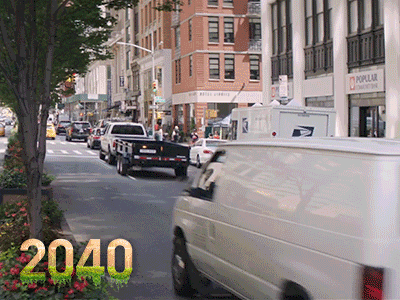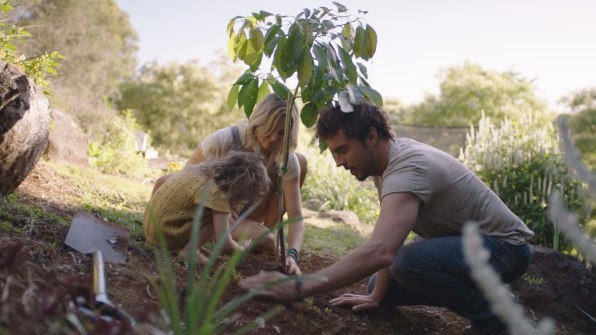See how good the world could be in 2040—if we act on climate solutions now
What would the world look like in 2040 if we actually implement the solutions for climate change that already exist in 2019? It’s a story that’s less often told than that of future catastrophe, and it’s the premise of a new documentary called 2040 from Australian filmmaker Damon Gameau, who tells the story by introducing us to his 4-year-old daughter, then visualizing in detail how technology could change by the time she’s 25. “I’m calling it an exercise in fact-based dreaming,” he says in the film.
The inspiration for the film came from his daughter. “First and foremost, I was feeling completely overwhelmed as a parent about the state of the planet ecologically, and just the constant torrent of bad news that we’re getting about it and what the projections were going to be for our daughter,” he tells Fast Company. “I really grappled with how I was going to have a conversation with her as she got older about what’s going on.”

He spent eight months talking to scientists and other experts about solutions before filming began, and realized that many of them are little known outside of the startups that are attempting to bring them to life. The film uses clever visual effects to explain the problem—at one point, Gameau illustrates the idea of greenhouse gas emissions by standing in front of a fireplace filled with tiny CGI cars and coal miners as soot pours into his house. Then it explores several solutions, from solar microgrids in Bangladesh to carbon-sequestering seaweed farms. After looking at examples of the work happening now, the film flashes back and forth to the year 2040. In one scene, we watch people ride in self-driving vehicles, freeing up road space that transforms into parks, bike lanes, train lines, and new housing.
Gameau saw a need for clear visions that let people better understand what change might actually be like. “I’ve thought for a while, intuitively, that this is the thing that’s missing—how can we expect people to move into this new reality if they can’t see it first and talk about it and describe it?” he says. As people question what might happen—and whether change involves sacrifice—this type of visualization can illustrate how life could improve as climate-friendly technology is deployed. “This is a crisis of imagination. We just don’t have leaders that throw out visions anymore. They’re often talking about protection and retreat. And that’s a very different state of mind.”

It’s a very different movie than Al Gore’s 2006 documentary An Inconvenient Truth, which relied on charts and graphs—as many organizations trying to talk about climate change still do. “I think that’s been a failure in a sense of we’ve relied only on graphs and logic to try and convince people of this argument,” says Gameau. “We’re a species that’s evolved to tell stories and we’re very visual, and I think it’s not their fault, but we’ve just left scientists to do all the communicating. Some of them are very good at it and some of them aren’t, but I think we’re at a point now they need help. We need to disseminate some of that information, and use language that’s more poetic and stirs the soul and talks to people at a human level, rather than only saying, you know, ‘anthropogenic,’ or ‘negative emissions.’ These aren’t things that engage people so they may want to take action.”
The film, which is currently being screened in Australia and New Zealand and will begin screening in the U.K. this month, will come to the U.S. next year. In Australia, Gameau says that he sees evidence in the screenings that public attitudes are changing, including in conservative and business communities that opposed climate action in the past. “That sense of urgency is starting to descend on a lot of people,” he says. He hopes that the film helps viewers find their own sense of agency and act. “My favorite quote is from Robert Swan, the Arctic explorer, who said that ‘the greatest threat to the planet is the belief that someone else will save it.’”
(12)



